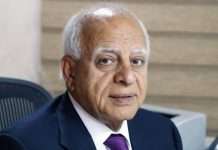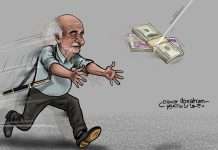حزب الله: أسباب الهذيان ووظائفه
حازم صاغية/الشرق الأوسط/01 حزيران/2025
Hezbollah: The Causes and Functions of Delirium
Hazem Saghieh/Asharq Al-Awsat/June 04/2025
Doctors and analysts agree that delirium is a sudden change in the brain function that leads to disturbance and mental confusion. It often results from a transformation the body is subjected to; it could be surgery or withdrawal that follows long-term alcohol abuse.
One of the more acute symptoms of delirium is inattention and reduced awareness of one’s surroundings; the delirious can sometimes forget who he is, where he is, and what he is doing there. This can result in physiological disorientation, manifesting as either near-paralytic lethargy or an erratic.
The statements coming from Hezbollah since the seismic change resulting from the “support war” and its ramifications are strikingly delirious. One could probably say, albeit with some creative license, that an analogy could be drawn with both surgery and recovery from addiction. Indeed, one would think that the war, the operation, has reduced Hezbollah’s triumphalist intoxication and its domineering behavior, challenging the party to adapt to this new reality.
Yet, listening to Hezbollah Secretary-General Sheikh Naim Qassem (and some of the party’s officials and spokesmen) set deadlines, speak of giving diplomacy and the government a chance, threaten to not extend these deadlines if they are not met, double down on the principle of “the army, the people and the resistance,” deny defeat, and adamantly refuse to relinquish their weapons, one unequivocally concludes that its utter failure to adapt has reinforced its delirium.
However, accuracy demands recognizing that this outcome is not without justification. Adaptation becomes exceedingly difficult when there has been something of a consensus, for over four decades, on idealizing the addiction. The binge that began in the early 1980s and ended only a few months ago had been presented as the epitome of sobriety, while those who refused to endorse this view were called on to treat their sick and scheming souls. The long-standing duality of arms, which allowed an illegitimate actor to make decisions of war and peace, was framed as the ultimate embodiment of prudence and the essence of truth. This extreme distortion had the upper hand in appointing presidents and ministers and shaping national policy and planning.
As for the fact the party, without an official mandate, had constituted a parallel society that had been above and outside the state, and had branded others traitors at a whim, this had also seemed like its indisputable right.
For years, Hezbollah was allowed to inform us that we were under threat as our senses and lived experiences were telling us the opposite, and it was allowed to warn us that we must resist, regardless of our desires, thoughts, or capabilities. Meanwhile, its subordinates were tasked with deciding which films must not be watched, and which books should not be translated or read, on our behalf.
This makes the transition difficult. From a phase in which addiction ruled and delirium was indulged, forcing others to adapt to it, we are now entering a phase in which delirium is constrained and called by its real and dangerous names, while its authors are the ones expected to adapt. In other words, we are transitioning from an era in which reality had been made to accommodate addiction, to one in which the addict is now called upon to accommodate reality. And, without a doubt, that is extremely difficult.
This delirium nonetheless remains functional. Iran will continue to find use for it so long as it is negotiating with Washington. Hezbollah’s weapons are to remain in its hands and not handed over to the state; just as the Houthis’ fireworks in Yemen, this bargaining chip must be maintained. Yet, everything seems smaller than it had once been: this applies just as much to the causes that are promoted as it does to material capacities and tools. The trajectory they have been on suggests that the war has led to decline and contraction, in parallel with Iran’s own transformation from a frightening force with serious leverage to a fearful one desperately hanging on to its damaged cards.
The contrast between the two phases could be summed up as follows: in the previous phase, a prime minister who went against the party and its patrons’ wishes would be assassinated in a grand theatrical attack, and the ensuing investigation would be obstructed. In the current phase, the prime minister is spitefully and obscenely slandered a “Zionist” for going against these wishes.
This is not to downplay the gravity of what is happening today, especially in light of the recent municipal election results that showed this delirious consciousness can, even in defeat, obtain (for reasons too complex to unpack here) another mass pledge of allegiance. This is the case despite the immense costs of maintaining the allegiance – for the security of the Lebanese people, for their economy, for the country’s reconstruction, and for the effort to ensure a national recovery. Those continuing to pledge allegiance may well ultimately end up hurting the most.
This state of affairs cannot be allowed to continue, and it must not be tolerated. If all Lebanese are called upon to make great efforts, coupled with a reduction of provocations, to integrate a third of the population into a unified national project, then those directly concerned are the first to be called on to break away from a delusional and defeated project that cannot lead anywhere safe.
حزب الله: أسباب الهذيان ووظائفه
حازم صاغية/الشرق الأوسط/01 حزيران/2025
يتّفق أطبّاء ومحلّلون على أنّ الهذيان تغيّر مفاجئ يطرأ على الدماغ فيسبّب اختلالاً في الشعور واختلاطاً في الذهن. وهو كثيراً ما يحصل إثر تحوّلات يتعرّض لها الجسد، قد تكون عمليّاتٍ جراحيّة أو تعافياً من الكحوليّة بعد إدمان مديد. لكنّ أحد الاحتمالات الحادّة الذي ينجم عن الهذيان فقدانُ التركيز والانتباه، وأحياناً نسيان المُصاب مَن يكون هو نفسه، وفي أيّ مكان يكون، وما الذي يفعله حيث يكون. وهذا ما يسبّب ترنّحاً في حركة الجسد التي قد تتراوح بين بطء يتاخم الشلل وتسارُع يشبه الهرولة.
وفي ما يصدر اليوم عن «حزب الله»، بعد التحوّل الضخم الذي عرّضته له «حرب الإسناد» وتوابعها، ثمّة قدْر صارخ من الهذيان. ولربّما جاز القول إنّ العمليّة الجراحيّة والتعافي من الإدمان يصلحان استعارةً، ولو بقدر من التصرّف. ذاك أنّه يُفترض بالحرب، وهي العمليّة الجراحيّة، أن تكون قد جفّفت خمرة الانتصار وعجرفة التسلّط وطرحت على الحزب سؤال التكيّف مع الواقع.
لكنّ من يسمع الشيخ نعيم قاسم، أمينه العامّ، وبعض قياديّيه والناطقين بلسانه، وهم يعطون فرصاً ومِهلاً للدبلوماسيّة وللحكومة، ويهدّدون بأنّ مِهلهم قد لا تُمدّد، ويؤكّدون على سريان مبدأ «الجيش والشعب والمقاومة»، وينفون حصول الهزيمة، ويلحّون على عدم تسليم السلاح، يقطع بأنّ فشلاً ذريعاً يُلمّ بالتكيّف ويثبّت الهذيان ويرسّخه.
غير أنّ الدقّة تستدعي القول إنّ تلك النتيجة لا تُعدم مبرّراتها. فالتكيّف يغدو صعباً جدّاً بعد أن عُوملَ الإدمان، على مدى أربعة عقود، بوصفه حالة طبيعيّة مثلى، وبعدما انعقد ما يشبه الإجماع حول وصف كهذا. ذاك أنّ السكرة التي امتدّت من أوائل الثمانينات حتّى أشهر قليلة خلت إنّما قُدّمت بوصفها هي الصحوُ بعينه، فيما كان الذين لا يُقرّون بذلك يُطالَبون بمعالجة نفوسهم المريضة أو المتآمرة.
هكذا رُسم ازدواج السلاح المديد، وتحكّم طرف غير شرعيّ بقرار الحرب والسلم، بوصفهما عين الصواب وكبد الحقيقة. وأتيحَ لهذا الغلط العظيم أن يملك اليد العليا في اختيار الرؤساء والوزراء، وفي وضع السياسات والخطط. أمّا أن يكون الحزب، وهو لا يحظى أصلاً بترخيص رسميّ، مُجتمَعاً موازياً يقف خارج الدولة الوطنيّة وفوقها، ويخوّن الكبير والصغير على هواه، فهذا أيضاً بدا حقّاً له لا يُمارى فيه. ولسنوات طويلة أتيح لـ»حزب الله» أن يُبلغنا أنّنا مُهدّدون، على رغم ما تقوله لنا أحاسيسنا وتجاربنا، ويُحذّرنا من أنّ علينا أن نقاوم، ضدّاً على ما تراه رغباتنا وأفكارنا وقدراتنا. وفي هذه الغضون تُرك لأذنابه أن تقرّر، نيابة عنّا، أيّ الأفلام ينبغي أن لا تُشاهَد وأيّ الكتب ينبغي أن لا تُترجم أو تُقرأ…
هكذا أمسى الانتقال صعباً من الطور الذي كان فيه الإدمان حاكماً، فسادَ تغنيج الهذيان وصار الآخرون مضطرّين إلى التكيّف معه، إلى طور بات معه الهذيان محكوماً، يُسمّى بأسمائه الفعليّة الخطيرة التي يحذّر منها الآخرون، فيما يغدو أصحابُه هم الطرفَ المُطالَب بالتكيّف.
فنحن، بلغة أخرى، ننتقل من زمن كان فيه الواقع هو المُطالَب بالتعايش مع الإدمان، إلى زمن يغدو معه المدمن مدعوّاً إلى التعايش مع الواقع. وأمر كهذا، دون أدنى شكّ، شديد الصعوبة.
لكنّ الهذيان، مع هذا، يبقى وظيفيّاً، يستدعيه الاستخدام الإيرانيّ ما دام التفاوض جارياً بين طهران وواشنطن. فمطلوبٌ، والحال هذه، إبقاء سلاح الحزب في اليد لا يُسلّم إلى الدولة، تماماً كما هو مطلوب بقاء المفرقعات الحوثيّة في اليمن ورقةً للمقايضة.
بيد أنّ كلّ شيء صار أصغر من ذي قبل: يصحّ هذا في القضايا المدّعاة كما يصحّ في الأدوات والقدرات. وهو مسار يدلّ إلى التآكل والانكماش بسبب الحرب، وفي موازاة التحوّل الإيرانيّ من قوّة مخيفة تملك أوراقاً جدّيّة إلى قوّة خائفة ذات أوراق متهالكة ومتداعية. وربّما جاز قياس الفارق بين المرحلتين على النحو التالي: في المرحلة الأوّلى كان يُقتل رئيس الحكومة المخالف لرغبات الحزب ورُعاته، على نحو مشهديّ مُضخّم فيما يُحال دون التحقيق في الجريمة، وفي الطور الثاني يُشتم، بحقد وبذاءة، رئيس الحكومة المخالف لتلك الرغبات بوصفه «صهيونيّاً».
وهذا ليس للتهوين من خطورة ما يجري اليوم، خصوصاً وقد دلّت الانتخابات البلديّة الأخيرة على أنّ في وسع وعي هذيانيّ، ولو مهزوم، أن يحافظ على مبايعة شعبيّة عريضة، لأسباب لا تتّسع لها هذه العجالة. وهذا علماً بأنّ كلفة الاستمرار في تقديم البيعة باهظة جدّاً على أمن اللبنانيّين واقتصادهم وإعادة إعمارهم وشروط إقلاعهم الوطنيّ. وقد يكون المبايعون أنفسهم الأكثر تضرّراً بين سائر المتضرّرين.
وهذا ما لا يمكن أن يستمرّ وما لا يجوز. فإذا كان اللبنانيّون جميعاً مدعوّين إلى بذل جهد أكبر، مصحوب باستفزازيّة أقلّ، لدمج ثلث السكّان في مشروع وطنيّ، فإنّ أصحاب المصلحة المباشرة أوّلُ المُطالَبين بالانفكاك عن مشروع هذيانيّ مهزوم لا يمكن أن يقود إلى مكان آمن.






















